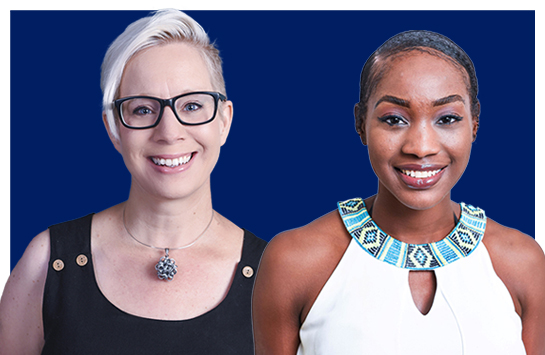Study: Microaggressions contribute to poor health outcomes in bisexual women
By Deborah Ziff Soriano
Two recent papers by UIC College of Nursing faculty members found that microaggressions — common, subtle indignities — can be just as harmful as a major discriminatory event, contributing to negative mental and physical health outcomes in bisexual women.
Associate professor Wendy Bostwick and assistant professor Ariel U. Smith were co-authors on both papers, one published in the Journal of Bisexuality and the other in Psychology of Sexual Orientation Gender Diversity, a publication of the American Psychological Association. Both relied on findings from the Women’s Daily Experience Study of 112 ethnically and racially diverse bisexual women.
Bostwick is principal investigator on a National Institute on Minority Health and Health Disparities grant that funded the Women’s Daily Experience Study, one of the first to focus on bi-identified women and mental health. Participants completed a baseline survey, followed by 28 days of e-diaries to capture microaggressions that they may have experienced during the previous 24 hours.
“The old saying goes, ‘Sticks and stones may break your bones, but words can never hurt you,” Smith said. “But you look at the data and realize that’s simply not true. Microaggressions that someone has experienced over a lifetime are correlated with mental and physical ailments they experience even today.”
The researchers looked at microaggressions related to sexual orientation, race and gender. Microaggressions could include denying a person’s bisexuality — suggesting it’s “just a phase” — or a rude or insulting comment about lesbian or gay individuals. A comment minimizing or denying the existence of racial discrimination is an example of a racial microaggression.
Participants reported an average of eight microaggressions of any type in the previous month, with almost all women — 97% — reporting at least one microaggression throughout the duration of the study.
Gender-based microaggressions were reported the most frequently. Women reported being sexually objectified on more than 15% of the days recorded.
The papers also found microaggressions were associated with poor mental health and binge drinking, smoking and marijuana use. The most consistent finding was an association between microaggressions and anxiety.
“Our findings suggest that for bisexual women, the weight of denigrating comments about their sexual identity, gender and race can contribute to poor health outcomes — whether such comments happened last year or yesterday,” Bostwick said. “Of course, these comments are situated in a larger context of systemic inequities, which may render bisexual women with fewer resources to cope when confronted with dismissive and disparaging comments about core aspects of who they are and their own lived experiences.”
Bisexual women of color were a majority in the study — 57% — a group that is notably absent in the literature, the researchers said. Latina bisexual women reported worse health outcomes than Black and white bisexual women in their daily diaries. Smith said the impact of microaggressions on bisexual women of color is an area where further research is needed.
“So often we focus on the large discriminatory events, like being denied housing or being fired from a job,” Smith says. “These subtle comments and slights can be just as harmful. That’s why it’s important to address it through education — understanding and recognizing what a microaggression is and then adapting policies to raise awareness.”
Co-authors included UIC Nursing visiting research specialist Larisa Burke, Amy L. Hequembourg, Alecia Santuzzi and UIC Nursing professor emerita Tonda Hughes, PhD ’89.

